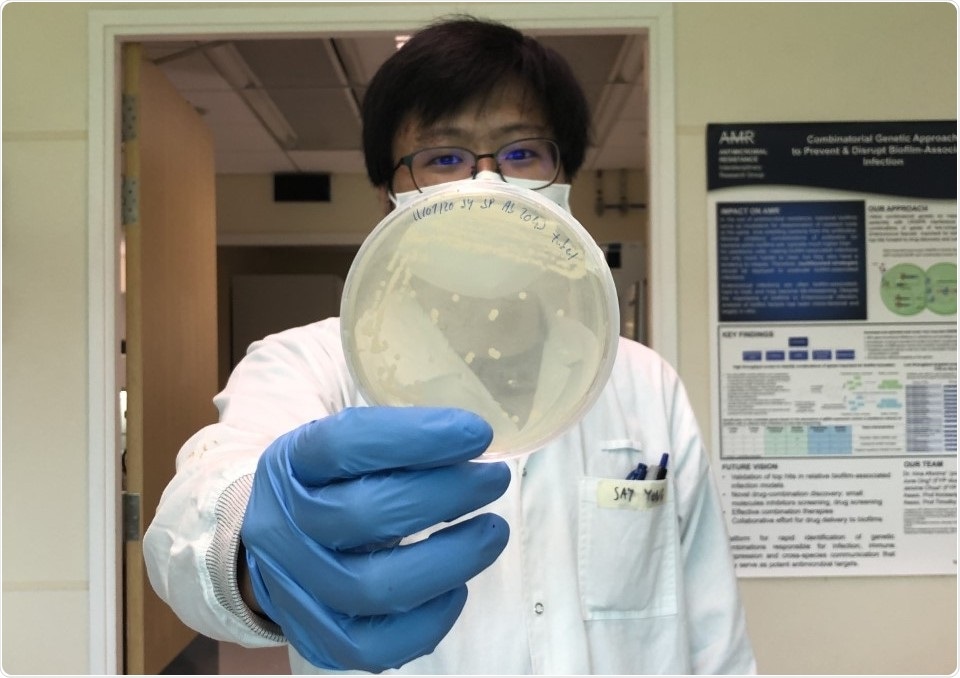Scientists from the Singapore-MIT Alliance for Research and Technology (SMART)—the Singapore-based research enterprise of MIT—have identified a novel method in which hydrogen sulfide (H2S) is used to reverse antibiotic resistance in certain bacteria.

SMART AMR study finds that exposing bacteria to hydrogen sulfide can increase antimicrobial sensitivity in bacteria that do not produce H2S. Image Credit: Jessie Choo Hui Ling (SMART AMR).
The rising antimicrobial resistance is a serious threat to the world, and if no action is taken, around 10 million people are estimated to die every year by 2050.
By 2030, drug-resistant diseases could push around 24 million people to extreme poverty and cripple the global economy, warned the World Health Organization.
In a majority of the microbes analyzed, the synthesis of endogenous H2S has been demonstrated to cause antibiotic tolerance; therefore, H2S has been regarded as a universal defense mechanism in microbes against antibiotics.
To test that theory, a research team from SMART’s Antimicrobial Resistance (AMR) Interdisciplinary Research Group (IRG) added H2S-releasing compounds to a pathogenic bacterium, called Acinetobacter baumannii, that is incapable of producing H2S on its own.
The researchers noted that instead of causing antibiotic tolerance, exogenous H2S sensitized the A. baumannii to numerous groups of antibiotics. It also reversed acquired resistance in A. baumannii to gentamicin—one of the common antibiotics used for treating many types of infections.
The study results were described in an article titled “Hydrogen sulfide sensitizes Acinetobacter baumannii to killing by antibiotics” and published in Frontiers in Microbiology, a leading journal. The study was supported by the Singapore National Medical Research Council’s Young Investigator Grant.
Until now, hydrogen sulfide was regarded as a universal bacterial defense against antibiotics. This is a very exciting discovery because we are the first to show that H2S can, in fact, improve sensitivity to antibiotics and even reverse antibiotic resistance in bacteria that do not naturally produce the agent.”
Dr Wilfried Moreira, Principal Investigator, Antimicrobial Resistance Interdisciplinary Research Group, Singapore-MIT Alliance for Research and Technology
Dr Moreira is also the study’s corresponding author.
While this research targeted the impacts of exogenous H2S on A. baumannii, the team hopes that the outcomes will be imitated in all microorganisms that do not naturally synthesize H2S.
Acinetobacter baumannii is a critically important antibiotic-resistant pathogen that poses a huge threat to human health.”
Say Yong Ng, Study Lead Author and Laboratory Technologist, Antimicrobial Resistance Interdisciplinary Research Group, Singapore-MIT Alliance for Research and Technology
“Our research has found a way to make the deadly bacteria and others like it more sensitive to antibiotics, and can provide a breakthrough in treating many drug-resistant infections,” Yong concluded.
The researchers have planned to perform additional studies to verify these fascinating discoveries in pre-clinical infection models, and also extend them to other microorganisms that are incapable of producing H2S.
Source:
Journal reference:
Ng, S. Y., et al. (2020) Hydrogen Sulfide Sensitizes Acinetobacter baumannii to Killing by Antibiotics. Frontiers in Microbiology. doi.org/10.3389/fmicb.2020.01875.